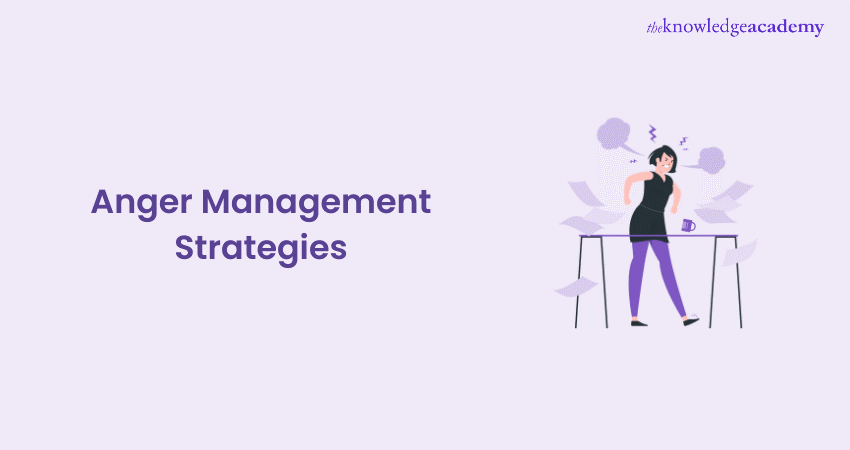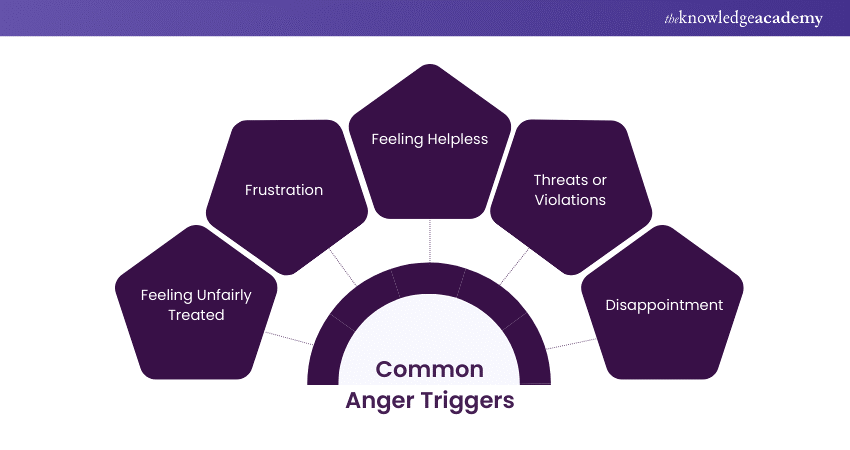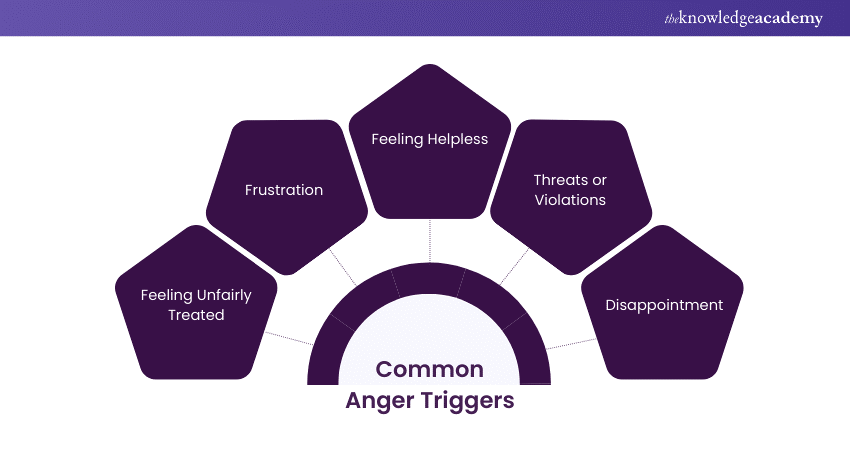We may not have the course you’re looking for. If you enquire or give us a call on 01344203999 and speak to our training experts, we may still be able to help with your training requirements.
Training Outcomes Within Your Budget!
We ensure quality, budget-alignment, and timely delivery by our expert instructors.

Every day, our minds ride a rollercoaster of emotions, and anger can be one of the trickiest to handle. While some have mastered the art of keeping their cool, others might find their temper flaring up, leading to harsh words or actions they later wish they could take back. Recognising what triggers your anger is the first step towards taming it. By learning to stay calm, we can all contribute to a more harmonious environment.
Dive into this blog for some easy-to-follow Anger Management Strategies that can help you steer clear of the anger trap and maintain peace of mind.
Table of Contents
1) What is Anger?
2) Anger Management Strategies
a) Identify Triggers
b) Step Away from the Triggering Situation
c) Consider Whether Your Anger is Helpful or Unhelpful
d) Find Healthier Ways to Express Your Anger
e) Stay Calm by Taking Care of Yourself
f) Use Humour to Relieve Tension
3) Conclusion
What is Anger?
Anger is a fierce emotion you feel when things have gone wrong, or someone has wronged you. It can be a normal response to frustrating or difficult situations. It can also help you express negative feelings towards something or motivate yourself to find critical solutions. However, excessive anger is not good for your health. When you are angry, several physical changes happen to your body. These changes make it difficult for you to think straight and harm your mental health. Let’s discuss some of the effects of anger below.
Effects of Anger
The causes of anger can be different from person to person when they pass through different situations. However, excessive anger can cause short-term or long-term effects like:
a) Short-term health problems: Excessive anger can give you headaches, digestion issues, insomnia, increased anxiety, depression, high blood pressure, skin problems and many more.
b) Long-term health problems: Anger can also affect you in the long term. There is a greater risk for heart attack and stroke, weakened immune system, heart disease, anxiety, and shortened lifespan.
Some of the major reasons people may get angry are problems in relationships, work, and legal and financial difficulties. It can also be the connection to violent crimes, destruction of property, abuse and so on.
Anger Management Strategies
Managing anger is important for maintaining healthy relationships and maintaining your mental and physical health. Here are some effective Anger Management techniques that may help you cope with your anger:
1) Identify Triggers

If you lose your control and yell at people more often, figure out those things that trigger your anger. It can be traffic jams, mocking comments from your colleagues, excessive tiredness or anything else that might shorten your fuse. You cannot always blame people or external circumstances for your not-cool behaviour. So, it is better that you understand the things that trigger your anger and plan your day accordingly. It will help you manage your stress better and help you jump out of those frustrating episodes.
2) Step Away From the Triggering Situation
Do not try to win an argument or stick with an unhealthy situation. It will only fuel your anger and push you to a volcanic eruption. So, one of the best Anger Management Strategies is to remove yourself from such situations if you can.
For example, imagine if there’s someone that you keep on getting into heated disputes with. Talk to them about the importance of taking some time out and resuming when you're both feeling calm. Later, have a productive conversation or resolve conflict when you're feeling ready to do it.
Do you want to get rid of those heated arguments with your loved ones? Join our Anger Management Training now!
3) Consider Whether Your Anger is Helpful or Unhelpful
Anger can be your friend and enemy, depending on the situation. So, you should ask yourself about it before calming yourself down. For example, imagine yourself in the role of a manager. Your subordinates didn’t finish their target on time. The deadline is around the corner. In this situation, your anger can help them bring you on the right track.
Sometimes, your anger can also become a warning sign, like when you are in an emotionally abusive relationship or a toxic friendship.
4) Find Healthier Ways to Express Your Anger
If you feel that the situation you are in is worth getting angry about, you should express your feelings in a healthy way. If you know how to resolve conflict in a positive way, it will help strengthen your relationships rather than damaging them.
For example, you can speak openly about your feelings without accusing the person. Use “I” statements to express how you feel and why without blaming them. Now, if you are too upset to talk calmly to the person, take a timeout. Stepping away from the situation can prevent the anger from escalating.
5) Stay Calm by Taking Care of Yourself
Anger can cause several issues in your life. Taking good care of your overall mental and physical health can help ease tension and diffuse anger problems. It will help you feel calmer and in control of your emotions.
For example, you can practice some exercises to reduce your stress. You can talk to people you trust in life. Getting advice from someone close to our hearts helps us think straight. Sometimes, lack of sleep can also cause anger issues. So, make sure you get seven to nine hours of good-quality sleep.
6) Use Humour to Relieve Tension
A little light-hearted humour can help lighten the mood when you feel yourself getting angry in a situation. This way, you can explain your points in a way that doesn’t hurt the other person’s feelings.
However, ensure that you laugh with the other person, not at them. Avoid sarcasm and mean-spirited humour. It will help reduce your tension and anger. It will convert a potential conflict into an opportunity for greater connection and intimacy.
For example, imagine yourself making a mistake at work or you’ve just spilt coffee over yourself. Instead of getting angry, try making a joke about it. Even if the joke comes out wrong, the only person you risk offending is yourself.
7) Count Down
Another technique you can follow is counting and letting your rational mind catch up with your feelings. So, whenever you feel out of control, try counting numbers. By the time you reach ten, start counting again.
8) Take a Breather
Whenever you are angry, you might notice your breathing gets quicker and shallower. One easy way to calm your body is to slow and deepen your breathing. Just try it today. Breathe slowly into your nose and out your mouth. Then, breathe deeply from your belly rather than your chest. Repeat your breaths till you feel better.
9) Go Walk Around
Regular exercise is very effective to reduce stress in the body and mind. Try to get some exercise daily to keep stress and anger at bay. Another quick way to manage anger is going for a brisk walk, bike ride, run. You can also do some other form of physical activity when you feel anger growing.
10) Relax Your Muscles
Muscle tension is also a sign of stress in your body. It will make you feel horrible when you are angry. You can handle this situation with a progressive muscle relaxation technique. This includes slowly tensing and then relaxing the muscle groups in the body, one at a time. Consider starting at the top of your head and moving your way to your toes, or vice versa.

11) Change Your Thinking
Anger can make you feel like things around you are worse than they really are. Therefore, reduce your anger by replacing negative thoughts with positive ones. You might also distract yourself by listening to your favourite music, cooking, looking at a treasured photo, savouring a cup of tea, or stroking a pet.
Develop skills that elevate your self-confidence in the work environment with our Personal Development Courses – Register now!
12) Recognise if you Need Anger Management Classes
If you think you are the only one going through this situation, you are absolutely wrong. Anger management classes let you meet others who are coping with the same struggles and learn various tips and techniques for managing your anger.
It can help decrease your anger and improve problem-solving and communication skills. Anger Management classes are led by a specialist or counsellor. This means you’ll discover how anger works and common strategies to deal with the emotion.
Conclusion
Anger is a common emotion everyone in the world experiences. However, sometimes the situations will be out of handle and cause problems for you. Anger Management Strategies are useful tools that can help you identify and manage anger in a productive way. Getting expert help is also a good way to address anger that is interfering with your quality of life.
Master effective communication with our Active Listening Training – Sign up today!
Frequently Asked Questions

Anger can increase heart rate, blood pressure, and adrenaline levels. This affects cardiac health and compromising the immune system, leading to mental and physical health issues.

Common anger triggers include stress, frustration, perceived injustice, and sensitivity to rejection or criticism.

The Knowledge Academy takes global learning to new heights, offering over 30,000 online courses across 490+ locations in 220 countries. This expansive reach ensures accessibility and convenience for learners worldwide.
Alongside our diverse Online Course Catalogue, encompassing 17 major categories, we go the extra mile by providing a plethora of free educational Online Resources like News updates, Blogs, videos, webinars, and interview questions. Tailoring learning experiences further, professionals can maximise value with customisable Course Bundles of TKA.

The Knowledge Academy’s Knowledge Pass, a prepaid voucher, adds another layer of flexibility, allowing course bookings over a 12-month period. Join us on a journey where education knows no bounds.

The Knowledge Academy offers various Personal Development Courses, including Anger Management, Stress Management and Managing Difficult Conversation Training. These courses cater to different skill levels, providing comprehensive insights into Behaviour Management.
Our Business Skills Blogs cover a range of topics related to Personal Development, offering valuable resources, best practices, and industry insights. Whether you are a beginner or looking to advance your Anger Management skills, The Knowledge Academy's diverse courses and informative blogs have you covered.
Upcoming Business Skills Resources Batches & Dates
Date
 Anger Management Training
Anger Management Training
Fri 14th Feb 2025
Fri 11th Apr 2025
Fri 13th Jun 2025
Fri 15th Aug 2025
Fri 10th Oct 2025
Fri 12th Dec 2025







 Top Rated Course
Top Rated Course



 If you wish to make any changes to your course, please
If you wish to make any changes to your course, please


